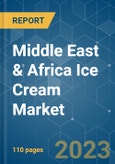Key Highlights
- The Middle East & Africa ice cream market is projected to register a CAGR of 10.7% during the forecast period.
- Branded and private-labelled ice creams comprise a vital part of the Middle East & African frozen dessert market. Sweltering summer benefited the Middle East & African ice cream market. Although prices continued to rise, retail value sales recorded significant growth. With the rise of Paul’s Homemade Ice Cream and the presence of international players, such as Baskin-Robbins and Haagen-Dazs, ice cream accounts for a significant share of the African dessert market. Additionally, the shift in consumer preference toward the vegan diet and the growing lactose intolerance population improved demand for the non-dairy ice cream category across the region. This, in turn, is augmenting the growth of the ice cream market in the region.
- There is also a rise in demand for premium ice creams, which will be one of the primary factors driving the market growth. Premium ice creams have become a popular product among health-conscious consumers due to the presence of high-quality ingredients and a lower amount of aeration than regular ice creams.
- Furthermore, the growing popularity of low-fat, keto-friendly ice creams and the introduction of healthy product variants with various flavors will likely provide numerous options for consumers. For instance, in December 2021, Thrivv, a healthy food brand based in the United Arab Emirates, launched keto-friendly bread, jam, and ice cream for people with diabetes on its e-commerce store and Noon Daily, Kinsons, and Shop Kitopi as well. The market in the region is therefore expected to grow due to these factors.
MEA Ice Cream Market Trends
Demand for Low-fat and Non-dairy Ice Cream Products
- Non-dairy products such as ice creams contain a high amount of lipids, vitamins, albumin, carbohydrates, and casein that provide significant health benefits. Shifting trends toward vegan lifestyles owing to increasing health consciousness and socialization trends are propelling the industry and shifting consumers' preferences toward low-fat products.
- High per capita ice cream consumption, particularly in the United Arab Emirates and Kingdom of Saudi Arabia, is boosting the product demand in the region. Comprehensive product variations through materials, including coconut, almond, and soy milk, will positively influence the industry's growth. Innovative flavour offerings, mainly including blended flavours, have enhanced product development. Increasing consumer spending on take-home and impulse products will further boost the non-dairy ice cream demand.
- Moreover, rising incidences of lactose intolerance and other milk-related allergies foster product demand. For instance, according to Britannica ProCon.org, in Saudi Arabia, in 2022, 28% of the country’s population had lactose intolerance; similarly, 81% of South Africa's population had lactose intolerance, while 73% of Morocco's Population had lactose intolerance
United Arab Emirates Dominating the Ice Cream Market
- Ice cream remains the favourite frozen dessert in the United Arab Emirates as it has an arid subtropical climate with long summers and brief warm winters. Thus, expatriates, tourists, and locals consume it throughout the year. The consumption is likely to increase with multinational ice-cream manufacturers such as Mars GCC and Unilever Middle East entry. A growing preference for natural, less processed, and convenient food and an increasing focus on low-calorie ice creams enable companies to tap into the market's growth potential.
- Many ice cream manufacturers have been instrumental in introducing new varieties and flavours. For instance, some of the most exotic concoctions in September 2022 include saffron gelato with Emirati pumpkin pudding, green apple wasabi, and pistachio baklava. To elevate the standard for extravagance in frozen desserts, Ahmad Almarri launched Canvas Gelato, the Dubai-headquartered artisanal ice cream company, in 2017. Almarri claimed they entered the ice cream industry to offer superior gelato with stronger flavours made with natural ingredients.
- Moreover, the growth of the tourism sector and restaurant businesses is also expected to support the growth of the ice cream market in the country. For instance, post-COVID-19, the tourism industry is regaining its trajectory with increasing inbound tourist trips to Saudi Arabia. The Saudi Commission for Tourism and Antiquities has estimated that around 3.48 million inbound tourists will visit Saudi Arabia in the year 2021.
MEA Ice Cream Market Competitor Analysis
The ice cream market is fragmented and competitive, comprising many regional and international competitors. The Middle East & Africa Ice Cream Market includes the company profiles of Unilever, General Mills Inc, Nestle, IFFCO Group, and Wells Enterprises, Inc. The most active companies in the market are mainly focused on introducing new products to cater to the interests of consumers. Key players are focusing on product development and product innovation to meet the consumer's needs by offering a variety of tastes and product quality to maintain premiumization. Some of the major players use mergers and acquisitions as their key strategy. The strategy to follow mergers and acquisitions by these top players is to sustain and secure a leading position in the industry. This will enable the companies to maintain dominance over other players, and the companies can remain a strong competition for other players in the market.Additional benefits of purchasing the report:
- The market estimate (ME) sheet in Excel format
- 3 months of analyst support
This product will be delivered within 2 business days.
Table of Contents
Companies Mentioned (Partial List)
A selection of companies mentioned in this report includes, but is not limited to:
- General Mills, Inc.
- Nestlé S.A.
- Inspire Brands, Inc.
- Unilever PLC
- IFFCO Group
- Saudia Dairy & Foodstuff Co Ltd
- Mars, Incorporated
- Wells Enterprises, Inc.
- Graviss Group
- Gatti Ice Cream










